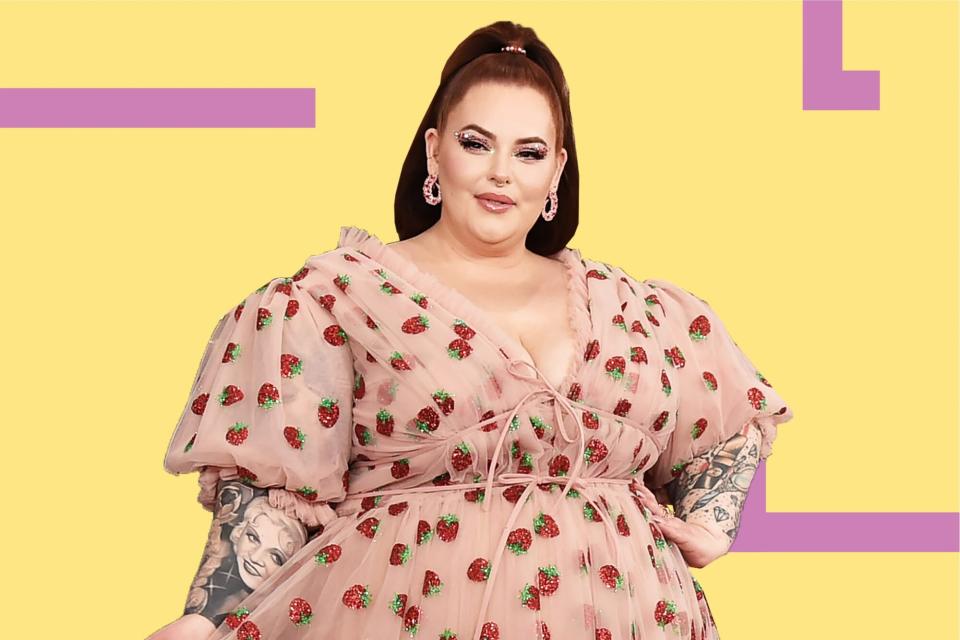Tess Holliday Revealed She's Recovering from Anorexia — Twitter's Response Highlights a Major Issue
On Saturday, Tess Holliday took to Twitter to share a health-related update with her followers. "I'm anorexic & in recovery," she wrote. "I'm not ashamed to say it out loud anymore. I'm the result of a culture that celebrates thinness & equates that to worth, but I get to write my own narrative now. I'm finally able to care for a body that I've punished my entire life & I am finally free."
In a follow-up post on Instagram, the model asked that everyone refrain from making any comments about her body. "For folks like me that are trying to reframe our relationships with our bodies & heal, hearing comments about weight is triggering as hell," she wrote in her caption. "It sets us back in our progress — and when people working on themselves see you commenting to me that way, it hurts THEM, not just me." (Related: Tess Holliday Shares Why She's No Longer Posting Her Workouts On Social Media)
Unfortunately, not everyone respected her wishes. On Twitter, Holliday received negative feedback about her revelation that she's recovering from anorexia, a lot of which centered around her weight. In response, Holliday tweeted "Not the 'but your [sic] fat how are you anorexic' comments. Y'all don't know how science & body works huh. My technical diagnosis is anorexia nervosa & yes, I'm still not ashamed."

Getty Images
This led to additional replies, with numerous Twitter users asserting that Holliday couldn't possibly have anorexia nervosa because of her weight. They argued that people who fit the technical definition of "anorexia nervosa," are underweight, while people who fit the definition of "atypical anorexia" aren't.
Yes, these tweets are accurate in the sense that that the Diagnostic and Statistical Manual of Mental Disorders (DSM–5), the foremost diagnostic tool for mental health professionals, makes the same distinction, according to Allison Chase, Ph.D., CEDS-S, regional clinical director at Eating Recovery Center in Texas. The criteria for anorexia nervosa listed in the DSM–5 include food restriction or failure to gain weight resulting in a "significantly low bodyweight" of what would be expected for their age, sex, weight, and height, according to the DSM-5. It also specifies a fear of gaining weight or becoming fat and a distorted view of oneself as touchstones of the condition.
"However, what's really, really important is that it doesn't change the fact that Tess' emotional functioning and physiological, psychological, all the pieces going with it, are just as significant regardless of what you label this," stresses Chase. "It's unfortunate that everybody is focusing on these words that define it, when the reality is her psychological distress and what makes it an eating disorder and a mental health disorder is just as predominant regardless of whether you use the word 'atypical' or not, from a treatment perspective." (Related: Tess Holliday Shares How Her Body Image Evolved During Motherhood)
In general, expressing doubt when someone says they have an eating disorder is very harmful, notes Kristen Tritt Flores, ACSW, a therapist who specializes in the treatment of eating disorders. Tritt Flores argued as much in a thread that Holliday retweeted. "Eating disorders are often characterized by a difficulty in trusting the self, and in self-advocacy," Tritt Flores tells Shape. "So if a patient is already pushing him or herself to speak up, advocate, and claim the truth of their experience then it's so important that we hear and believe them...Challenging someone's truth walls us off from learning from them, about them, and denies them access to the care they need."
Eating disorder therapist here, worked in treatment centers my whole career & second this. We don’t distinguish btw subcategories of diagnoses when talking about patients. It is so harmful to exclude someone from their diagnosis because they don’t match the image in your head
— Kristen Tritt Flores (@kristen_cares) May 2, 2021
When it comes to the distinction between anorexia nervosa and atypical anorexia, in particular, some mental health professionals are arguing for modified definitions in the next version of the DSM, says Tritt Flores. "Currently what I'm seeing and hearing from my colleagues is that this weight stipulation within the anorexia nervosa diagnosis is more prohibitive than helpful," she says. "For instance, if a patient is already existing in a bigger body and then loses a certain amount of weight extremely rapidly via intense calorie restriction, overexercise, and compulsive food rituals, then this most certainly is a case that would be in alignment with anorexia nervosa. However, not being in an 'underweight' body would mean that this client does not receive a diagnosis of anorexia nervosa, and her experience is therefore invalidated or mischaracterized." (Related: How the Coronavirus Lockdown Can Affect Eating Disorder Recovery — and What You Can Do About It)
Yesterday Holliday responded once again to the dialogue around her posts. "Sticking my neck out constantly is excruciating, and lonely," she wrote in an Instagram story. "Gonna take a social break, thank you all for the love."
Before taking a step back, however, Holliday sparked an important conversation. "Tess is making a really good point that if we sort of get caught up in all of these sort of these physiologically-driven stereotypes," says Chase. And because of these stereotypes, "so many individuals may not be reaching out for help or may not be getting the help that they need."
If you're struggling with an eating disorder, you can call the National Eating Disorders Helpline toll-free at (800)-931-2237, chat with someone at myneda.org/helpline-chat, or text NEDA to 741-741 for 24/7 crisis support.

